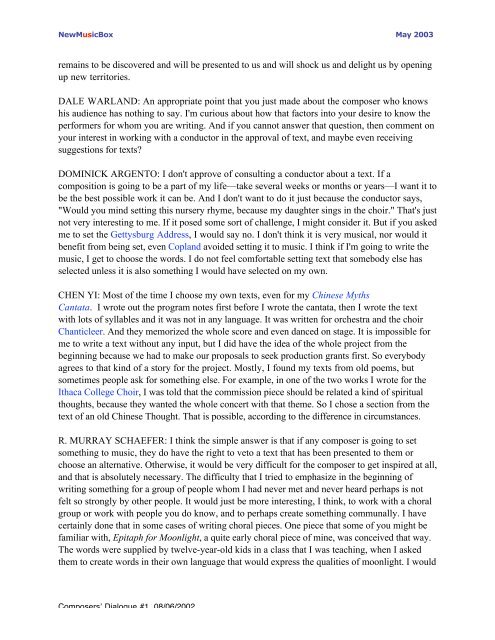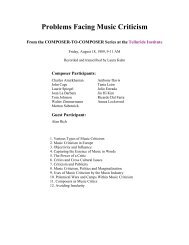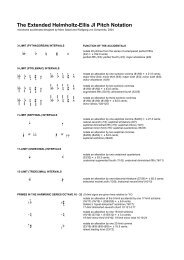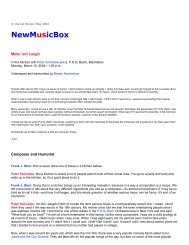Sixth World Symposium on Choral Music ... - NewMusicBox
Sixth World Symposium on Choral Music ... - NewMusicBox
Sixth World Symposium on Choral Music ... - NewMusicBox
You also want an ePaper? Increase the reach of your titles
YUMPU automatically turns print PDFs into web optimized ePapers that Google loves.
New<strong>Music</strong>Box May 2003<br />
remains to be discovered and will be presented to us and will shock us and delight us by opening<br />
up new territories.<br />
DALE WARLAND: An appropriate point that you just made about the composer who knows<br />
his audience has nothing to say. I'm curious about how that factors into your desire to know the<br />
performers for whom you are writing. And if you cannot answer that questi<strong>on</strong>, then comment <strong>on</strong><br />
your interest in working with a c<strong>on</strong>ductor in the approval of text, and maybe even receiving<br />
suggesti<strong>on</strong>s for texts?<br />
DOMINICK ARGENTO: I d<strong>on</strong>'t approve of c<strong>on</strong>sulting a c<strong>on</strong>ductor about a text. If a<br />
compositi<strong>on</strong> is going to be a part of my life—take several weeks or m<strong>on</strong>ths or years—I want it to<br />
be the best possible work it can be. And I d<strong>on</strong>'t want to do it just because the c<strong>on</strong>ductor says,<br />
"Would you mind setting this nursery rhyme, because my daughter sings in the choir." That's just<br />
not very interesting to me. If it posed some sort of challenge, I might c<strong>on</strong>sider it. But if you asked<br />
me to set the Gettysburg Address, I would say no. I d<strong>on</strong>'t think it is very musical, nor would it<br />
benefit from being set, even Copland avoided setting it to music. I think if I'm going to write the<br />
music, I get to choose the words. I do not feel comfortable setting text that somebody else has<br />
selected unless it is also something I would have selected <strong>on</strong> my own.<br />
CHEN YI: Most of the time I choose my own texts, even for my Chinese Myths<br />
Cantata. I wrote out the program notes first before I wrote the cantata, then I wrote the text<br />
with lots of syllables and it was not in any language. It was written for orchestra and the choir<br />
Chanticleer. And they memorized the whole score and even danced <strong>on</strong> stage. It is impossible for<br />
me to write a text without any input, but I did have the idea of the whole project from the<br />
beginning because we had to make our proposals to seek producti<strong>on</strong> grants first. So everybody<br />
agrees to that kind of a story for the project. Mostly, I found my texts from old poems, but<br />
sometimes people ask for something else. For example, in <strong>on</strong>e of the two works I wrote for the<br />
Ithaca College Choir, I was told that the commissi<strong>on</strong> piece should be related a kind of spiritual<br />
thoughts, because they wanted the whole c<strong>on</strong>cert with that theme. So I chose a secti<strong>on</strong> from the<br />
text of an old Chinese Thought. That is possible, according to the difference in circumstances.<br />
R. MURRAY SCHAEFER: I think the simple answer is that if any composer is going to set<br />
something to music, they do have the right to veto a text that has been presented to them or<br />
choose an alternative. Otherwise, it would be very difficult for the composer to get inspired at all,<br />
and that is absolutely necessary. The difficulty that I tried to emphasize in the beginning of<br />
writing something for a group of people whom I had never met and never heard perhaps is not<br />
felt so str<strong>on</strong>gly by other people. It would just be more interesting, I think, to work with a choral<br />
group or work with people you do know, and to perhaps create something communally. I have<br />
certainly d<strong>on</strong>e that in some cases of writing choral pieces. One piece that some of you might be<br />
familiar with, Epitaph for Mo<strong>on</strong>light, a quite early choral piece of mine, was c<strong>on</strong>ceived that way.<br />
The words were supplied by twelve-year-old kids in a class that I was teaching, when I asked<br />
them to create words in their own language that would express the qualities of mo<strong>on</strong>light. I would<br />
Composers’ Dialogue #1, 08/06/2002





